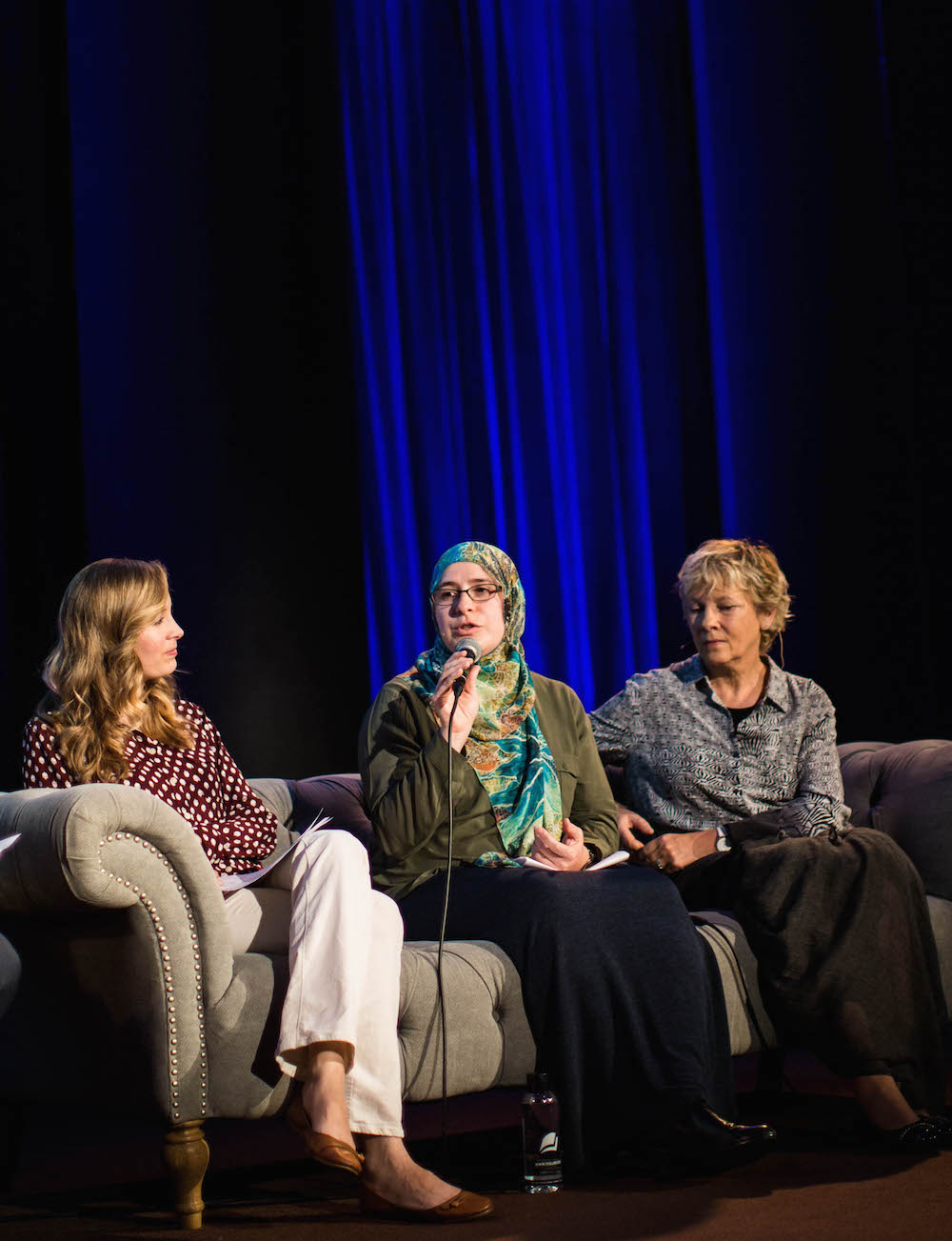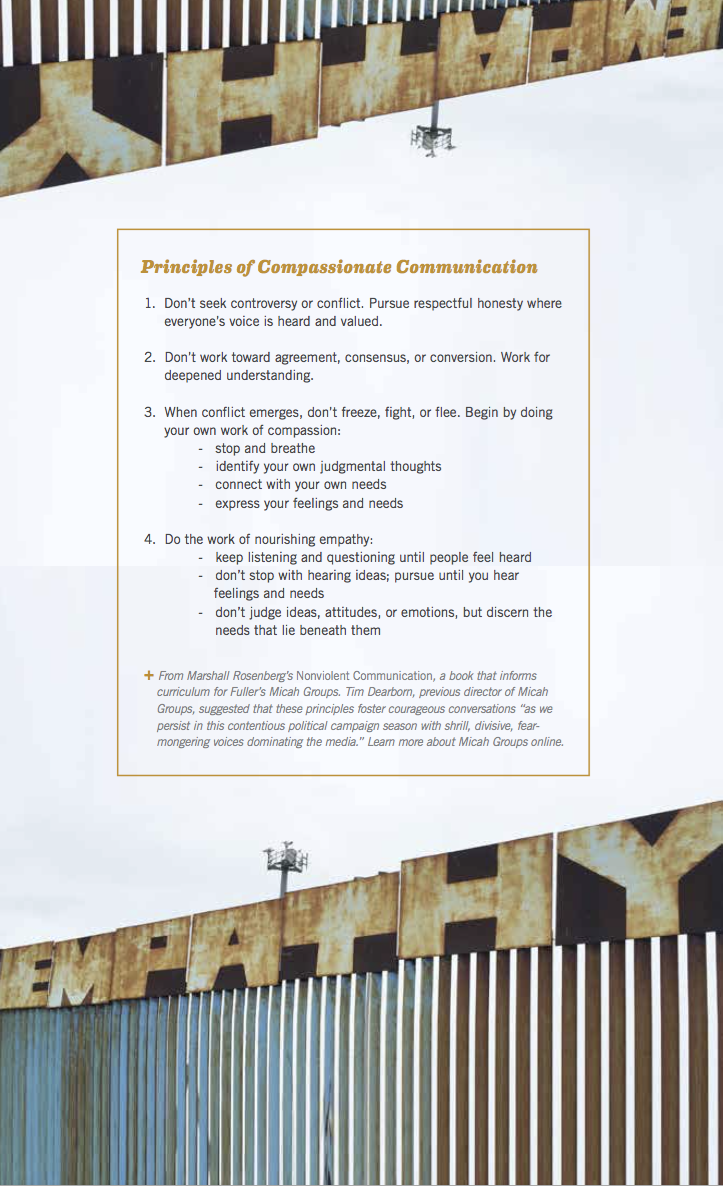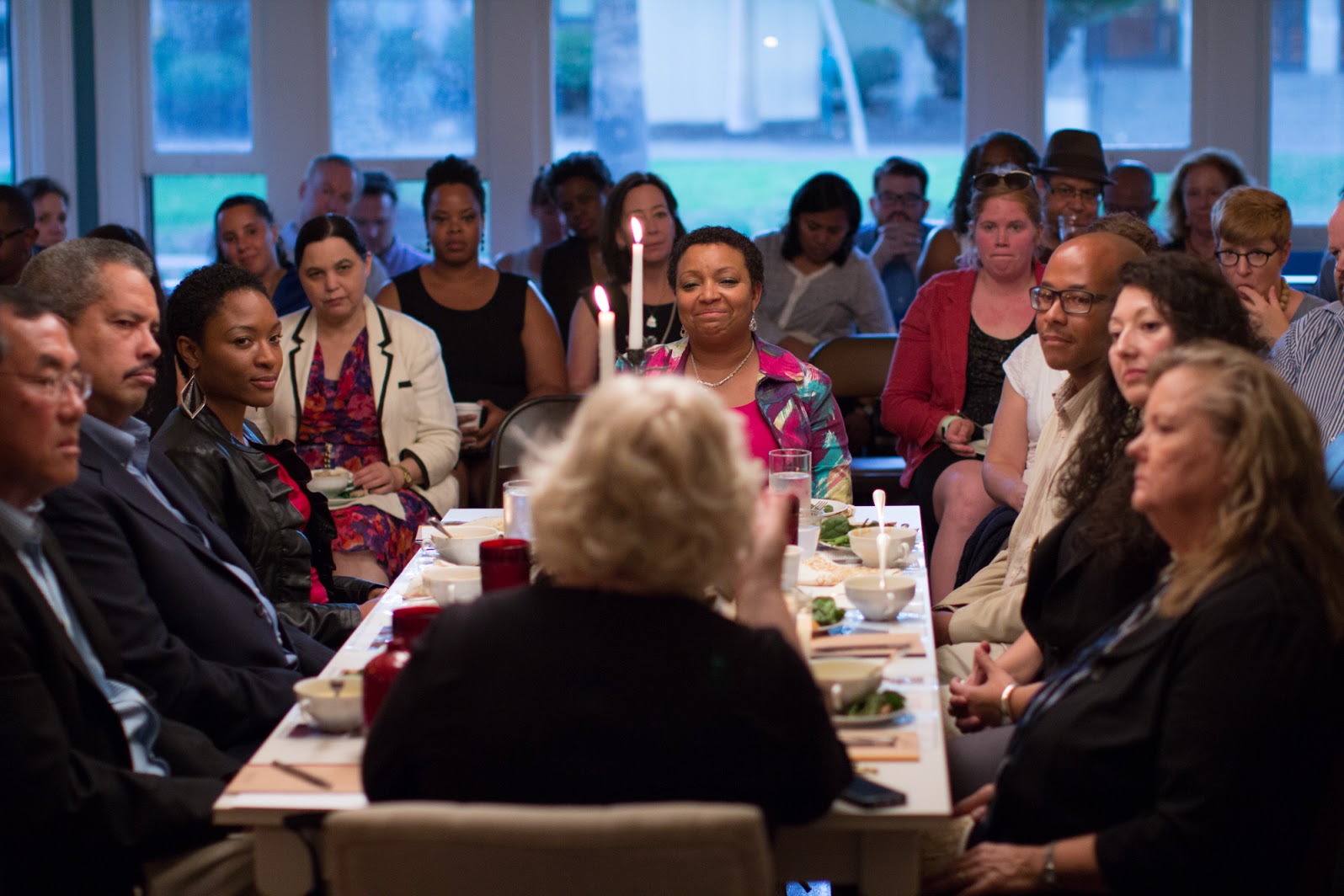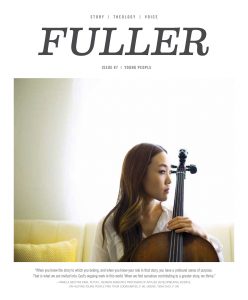
“In Christ, we are bound to one another, even to those whose views diverge from our own. Unlike others who might pursue secular politics as an end in itself or as a way of assuring their significance, we are already assured of our destiny because God has secured it by Christ’s work; complete shalom will one day come. Such knowledge frees us to address difficult issues in the present with humility, trusting that by God’s grace, good will come of our desire to be faithful to God and to neighbor. Even out of our rivalries, Christ can create both a church and a society that embody more closely the coming kingdom of God.”
+ Erin Dufault-Hunter, assistant professor of Christian ethics, in an essay available here. Whether it’s an interfaith panel or “die-in” demonstration (pictured below), a protest march or discussion about women in leadership, Fuller is committed to civil dialogue among those who agree or disagree—a commitment that has always been part of our ethos, as reflected in words on this page from our early presidents. In this election season and at all times, Fuller seeks to be a place where issues and differing beliefs can be expressed, heard, and responded to with kindness and Christlike grace.
“Jesus is a model of civility, of convicted civility. He associates with harlots and with corrupt tax collectors and other ‘sinners’ in the culture, and yet it’s very clear that Jesus did not approve of prostitution or of compliance with the economic practices of the Roman Empire. Jesus reached out to people, but in none of that was he sacrificing convictions about what is right, what is good, what is true. And some of his harshest judgments were for people who were very condemnatory toward other people and not aware of their own sin or their own shortcomings.”
+ Richard Mouw, Fuller’s fourth president (1993–2013), from an interview with Krista Tippett on the On Being radio show and podcast. Dr. Mouw suggests in his book Uncommon Decency that political engagement “requires a heartfelt commitment to your fellow-citizens” and the desire “to promote the well-being of people who seriously disagree with you on important matters.” Hear Dr. Mouw discuss “convicted civility” with Mark Labberton on the new FULLER studio podcast Conversing.

“The seminary should inculcate on its students an attitude of tolerance and forgiveness toward individuals whose doctrinal convictions are at variance with those that inhere in the institution itself. . . . Whoever meditates on the mystery of his own life will quickly realize why only God, the searcher of the secrets of the heart, can pass final judgment. We cannot judge what we have no access to. The self is a swirling conflict of fears, impulses, sentiments, interests, allergies, and foibles. It is a metaphysical given for which there is no easy rational explanation. Now, if we cannot unveil the mystery of our own motives and affections, how much less can we unveil the mystery in others?”
+ Edward Carnell, Fuller’s second president (1954–1959), from his inauguration address, available here.

+ Pictured left to right: Michal Meulenberg, Fuller PhD student and cofounder of Miss Understanding; Duaa Alwan, certified speaker, Muslim Speaker Network; Evelyne A. Reisacher, associate professor of Islamic studies and intercultural relations. They were joined by other guests at FULLER dialogues: Muslims and Christians, an event to foster understanding and compassion between Muslims and Christians. Watch more from the event here.
Speaking about Politics in the Church
+ The “Turbulent Church in the 21st Century” was an ecumenical gathering held in Chicago to discuss politics, society, and the church. Listen to lectures from the event here.
“My dear friends, we must come to terms with our racial and ethnic and gender differences as a church. . . . Until this happens, the turbulent church will continue to manifest a defeated and dichotomistic character that produces the kind of disparities and injustices experienced in the very society we’re trying to reach out to.”
+ Oscar García-Johnson, associate dean for the Center for the Study of Hispanic Church and Community, at the “Turbulent Church in the 21st Century” event.
“The interesting thing about a promised land culture is that in the conditions of a shared vision, it’s possible for us to tolerate for ourselves and our neighbors a kind of complacency that suggests we can get by with less discipline and peculiarity. But if we actually believe that Christian identity is meant to be the light and salt of the world and is therefore meant to be enacted and embodied, then suddenly our faith needs to surge forward toward these places of collision, disagreement, violence, anxiety, injustice, and suffering. That is the very nature of the identity of the people of God.”
+ Mark Labberton, president of Fuller Seminary, from his comments at the “Turbulent Church in the 21st Century” event.
“We place social and political action and advocacy within the framework of the church’s role as caring pastor to society—and within the framework of the teachings of Jesus that ground this vision. At our best, Christians vote, lobby, campaign, meet with political leaders, and become such leaders themselves as a natural outflow of our pastoral concern for the social good under the sovereignty of God who loves all persons. We are alerted to the brokenness, need, and injustice through ministry with people or awareness of their needs, and care for such persons then moves us, in part, toward politics.”
+ Glen Stassen, the late professor of Christian ethics at Fuller, and David Gushee, in their book Kingdom Ethics: Following Jesus in Contemporary Context.
“Now, as we discern the political roles our churches should play as part of the wider communities of our places, we must certainly not romanticize the political systems of the US. They are not the sole mediator of the political life of Christian communities. Their tendencies to reduce people to voting units or blocs, to bundle political concerns together in incoherent platforms, and to justify unjustifiable sacrifices are symptomatic of the systems’ limits, particularly as the political scale reaches the national and money saturates political processes. The church is called to embody a life-giving political community with or without a healthy political system in its places to give it further expression, and sometimes the church must openly refuse politically established strictures on its political calling. Rather than merely choosing from among the political options, the church must always be involved in generating new options.”
+ Tommy Givens, assistant professor of New Testament studies, from “The Politics of the Church in the World,” a forthcoming essay in Precepts, republished here with their permission.
“Fear governs so much of the social discourse in this country and even of the churches. We Christians, in the West especially, have become obsessed with narratives of decline. It seems as though our theological imaginations can only see the social world, especially a much more diverse social world, as a turn toward death.”
+ Willie Jennings (MDiv ’87), associate professor of theology at Duke Divinity School, at the “Turbulent Church in the 21st Century” ecumenical event.
“I used to avoid preaching on topics that had political implications. It didn’t seem to be worth the grief. The people that agreed with me would leave church no different than when they came, and the folks who disagreed with me would too easily ignore the sermon. But then the Holy Spirit (coming in the voice of my wife) challenged me. Do I believe that what we believe should influence how we vote? Of course. And do I believe that sermons should help people clarify their beliefs? Yes. Then shouldn’t our sermons talk about politics? Well, okay. We can either assume that the beliefs that affect voting are so private that the preacher should never talk about them, or we are going to have to find a way to preach about faith and politics without alienating people.”
+ Scott Cormode, director of innovation and professor of leadership, in an essay reflecting on his experience preaching about politics at his church, available here.
+ Fuller’s Story Table, pictured above, takes a theme from FULLER magazine and brings it to life at the dinner table. Guests who embody the theme in unique ways tell their stories around the table, and members of the community are invited to listen in. It is in this context that we introduce complex issues like reconciling race, psychology and theology, and women in leadership. While we may not all agree, the table creates space for engaging one another with vulnerability and compassion, no matter what our convictions might be.
“We want to learn from responsible critics, to open ourselves to review and to renewal. Institutional smugness must not be our posture. We are members of Christ’s Body, open to the counsel and influence of other Christians. If those who question the stance of Fuller in any area of our faith or mission are more in touch with the meaning of God’s Word and the needs of God’s world than we are, we must learn from them. We are ready to engage in theological discussion with responsible representatives of other points of view on any terms that seem fruitful and that are compatible with the educational and spiritual goals of Fuller.”
+ David Allan Hubbard, Fuller’s third president (1963–1993), from his notable address on the “Good Ship Fuller.”
“It must be established that political ideologies are not synonymous to Christian doctrines. . . . We must be objective enough to look into the opposing political ideologies to identify principles that align with our faith, adopt and affirm them, while rejecting those that conflict with our faith and beliefs. The fact of the matter is that both the liberal and the conservative wings of the American political landscape contain elements we can agree and disagree with.”
+ Chinaka Samuel DomNwachukwu (PhD ’99) on the “polarization of the American political landscape” in his book Multiculturalism: A Shalom Motif for the Christian Community.

+ Sponsored by the Office of Spiritual Formation, MDiv students Lauren Grubaugh and Jennifer Guerra led a group of faculty and students on a trip to the security wall dividing California and Mexico (pictured above). Their experience, framed as a “border pilgrimage,” reoriented abstract debates into a human struggle that requires empathy and compassion in the midst of complex political issues.
Resources
A Purple State of Mind: Finding Middle Ground in a Divided Culture
Craig Detweiler (Harvest House, 2008)
Multiculturalism: A Shalom Motif for the Christian Community
Chinaka Samuel DomNwachukwu and HeeKap Lee (Wipf & Stock, 2014)
The Dangerous Act of Loving Your Neighbor: Seeing Others Through the Eyes of Jesus
Mark Labberton (IVP Books, 2010)
Uncommon Decency: Christian Civility in an Uncivil World
Richard Mouw (InterVarsity Press, 2010)
Just Peacemaking: Transforming Initiatives for Justice and Peace
Glen Stassen (John Knox Press, 1992)
Available Classes
Discipleship in a Secular Society with Erin Dufault-Hunter
The Theology and Ethics of Martin Luther King Jr. with Hak Joon Lee
Perspectives on Social Ethics with Richard Mouw
Christian Ethics with various faculty
Politics and the Global Church with various faculty


